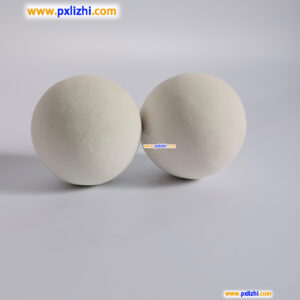
。
# Inert Ceramic Ball Applications in Industrial Processes
## Introduction to Inert Ceramic Balls
Inert ceramic balls are high-performance ceramic spheres widely used in various industrial applications. These balls are made from high-quality alumina or other ceramic materials, offering exceptional chemical stability, thermal resistance, and mechanical strength. Their inert nature makes them ideal for processes where chemical reactions with process materials must be avoided.
## Key Properties of Inert Ceramic Balls
The effectiveness of inert ceramic balls in industrial applications stems from their unique combination of properties:
- High chemical resistance to acids and alkalis
- Excellent thermal stability at extreme temperatures
- Superior mechanical strength and wear resistance
- Low water absorption and porosity
- Uniform size and spherical shape
## Major Industrial Applications
1. Catalyst Support in Chemical Reactors
Inert ceramic balls serve as excellent catalyst supports in fixed-bed reactors. They provide structural support for catalyst particles while ensuring even distribution of reactants. Their thermal stability prevents deformation at high temperatures, maintaining reactor efficiency.
2. Packing Material in Distillation Columns
These ceramic balls are commonly used as random packing in distillation and absorption towers. Their spherical shape promotes efficient vapor-liquid contact while minimizing pressure drop across the column.
3. Grinding Media in Ball Mills
Due to their exceptional hardness and wear resistance, inert ceramic balls are ideal grinding media for processing sensitive materials where contamination must be avoided, such as in the pharmaceutical and food industries.
4. Heat Transfer Mediums
In high-temperature heat transfer applications, ceramic balls serve as excellent heat exchange media. Their thermal stability allows operation in environments where metal balls would degrade.
Keyword: inert ceramic ball
5. Filtration Systems
Inert ceramic balls are used in deep bed filtration systems for liquid and gas purification. Their uniform size and chemical inertness make them perfect for filtering corrosive or high-temperature media.
## Advantages Over Alternative Materials
Compared to metal or plastic alternatives, inert ceramic balls offer several distinct advantages:
- Longer service life due to superior wear resistance
- Higher temperature tolerance (up to 1600°C for some formulations)
- Complete chemical inertness in most environments
- Non-contaminating to process materials
- Lower maintenance requirements
## Selection Considerations
When selecting inert ceramic balls for industrial applications, several factors should be considered:
- Alumina content (typically ranges from 23% to 99%)
- Size and size distribution requirements
- Specific gravity and bulk density
- Crushing strength specifications
- Thermal shock resistance
- Surface smoothness requirements
## Future Trends in Ceramic Ball Technology
The future of inert ceramic balls includes development of advanced formulations with even higher temperature resistance, improved mechanical properties, and specialized surface characteristics. Nanotechnology applications may lead to ceramic balls with tailored porosity for specific catalytic applications.
As industrial processes become more demanding, inert ceramic balls will continue to play a vital role in ensuring efficient, reliable, and contamination-free operations across multiple industries.